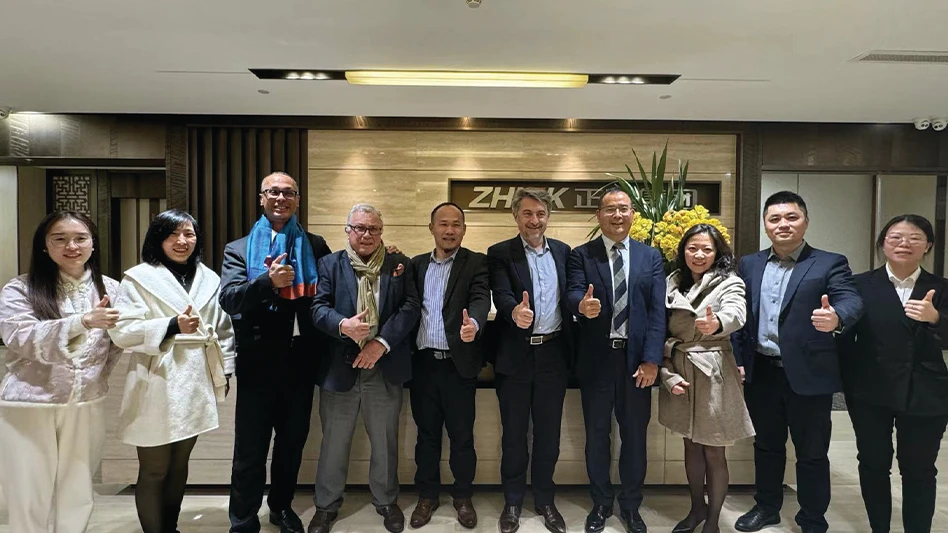
Photo courtesy of Carbios
Carbios, a France-based company that uses biological technologies to recycle plastic and textiles, has signed a joint letter of intent with China-based polyethylene terephthalate (PET) producer Zhink Group to build a biorecycling plant in China using Carbios’ enzymatic depolymerization technology to serve the global market.
This agreement makes official the collaboration toward a long-term partnership in view of a first licensing contract to build a plant with a minimum annual processing capacity of 50,000 tons of prepared PET scrap and would contribute to accelerating a circular economy for plastic and textiles.
RELATED: Carbios finds engineering partner for PET recycling project
“There is great momentum in China to accelerate the circular economy and meet its target of carbon neutrality by 2060,” Carbios CEO Emmanuel Ladent says in a news release. “The technology developed by Carbios makes perfect sense in this context: capable of recycling all types of PET waste, it promotes a circular economy with high-quality products and significantly reduces the carbon footprint of industries. As a leader in PET production, Zhink is considered as a key partner for introducing our technology into China and will stimulate our international deployment.”
Carbios notes that China is the world’s largest PET producer, making 67 million tons annually, which represents 61 percent of global production. With regional and global demand for recycled PET (rPET) growing, Carbios says China also has the potential to take the lead in rPET production. In 2021, 58 percent of the world’s rPET was consumed in Asia (with 38 percent in China), underscoring the region’s importance as a producer and consumer of the resin.
Also, Carbios says China is a key transformer of PET into resins and fibers used in numerous applications in the packaging and textile industries. Notably, China is the primary country for transforming PET into fiber, representing 78 percent of all PET fiber transformation in the world.
The Zhink Group’s focus is on the development of the global PET and textile industries, and to be competitive in terms of sustainability. The firm, based in Hangzhou, China, produces 3 million tons of PET annually, serving domestic and global markets. Carbios has developed a technology that enables efficient and solvent-free recycling of PET plastic and textile scrap into virgin-like products.
The initial agreement between the two firms would allow Zhink to increase its rPET capacities and meet its sustainable competitiveness goals by offering rPET from enzymatic recycling, a solution that can process all types of PET scrap—including hard-to-recycle items such as opaque and colored bottles, multilayer food trays and textile scrap—while reducing CO2 emissions by 57 percent compared to virgin PET production.
“For Zhink, the strategic focus is on the development of two global industries, PET and textiles, and to be a leader in the industry with sustainable competitiveness,” Zhink Group President Zhu Guoyang says. “We are actively promoting our subsidiaries to develop our PET recycling portfolio and are very interested in Carbios’ revolutionary biorecycling technology to reduce carbon emissions.”
Carbios says this agreement marks a significant step in the deployment of its technology worldwide and rollout of its licensing model to achieve its goal of being a leading PET recycling technology provider by 2035. This Asia-based plant under license by Zhink would come in addition an industrial-scale enzymatic PET recycling plant which currently is under construction in Longlaville, France.
The opening of official discussions with Zhink for a licensing agreement marks an important milestone in Carbios’ market entry into China, according to the company. It adds that since its inception, all of Carbios’ families of patents own one or more titles in China, and for its PET biorecycling technology, Carbios currently has 28 titles of force in China covering both the industrial process and the enzymes used, including variants that will be used in the industrial process.
Carbios, Tomra partner
In mid-June, Carbios signed an agreement with Tomra Textiles—a tech venture started by Norway-based Tomra ASA—to collaborate on establishing an efficient stream in Northern Europe from textile scrap collection, sorting and preparation to recycling using Carbios’ enzymatic depolymerization technology at its first commercial plant, which is currently under construction in Longlaville, France.
RELATED: Carbios celebrates groundbreaking of PET recycling plant
The monomers obtained will be used to produce rPET fiber, closing the loop for polyester textile circularity. Additionally, Tomra Textiles aims to close the gap on textile circularity by contributing to designing and scaling textile sorting plants. Under this partnership agreement, Tomra Textiles will explore specific, tangible measures to enable the preparation of postconsumer polyester scrap for biorecycling according to Carbios’ specifications.
“Carbios is taking the lead in forming an efficient value chain for textile circularity and actively engages with global industry leaders such as Tomra to shape the future of sustainable textiles,” Ladent says.
Vibeke Krohn, head of Tomra Textiles, adds that the textile industry has been optimized for cost and efficiency for centuries, and closing the gap means scaling all the elements of a circular value chain—from collection to sorting to recycling technologies.
“Future recycling solutions depend on reliable access to feedstock,” he says. “Through the collaboration with Carbios, we hope to stimulate further investments needed to scale textile circularity.”
Latest from Recycling Today
- BMW Group, Encory launch 'direct recycling’ of batteries
- Loom Carbon, RTI International partner to scale textile recycling technology
- Goodwill Industries of West Michigan, American Glass Mosaics partner to divert glass from landfill
- CARI forms federal advocacy partnership
- Monthly packaging papers shipments down in November
- STEEL Act aims to enhance trade enforcement to prevent dumping of steel in the US
- San Francisco schools introduce compostable lunch trays
- Aduro graduates from Shell GameChanger program





